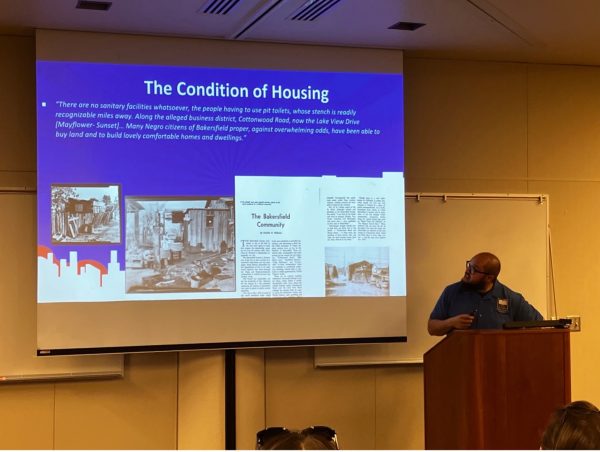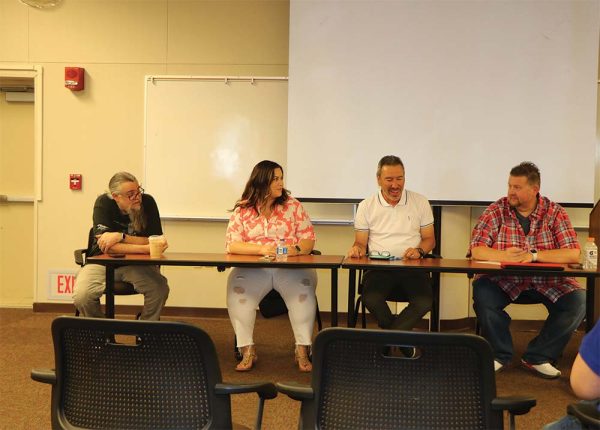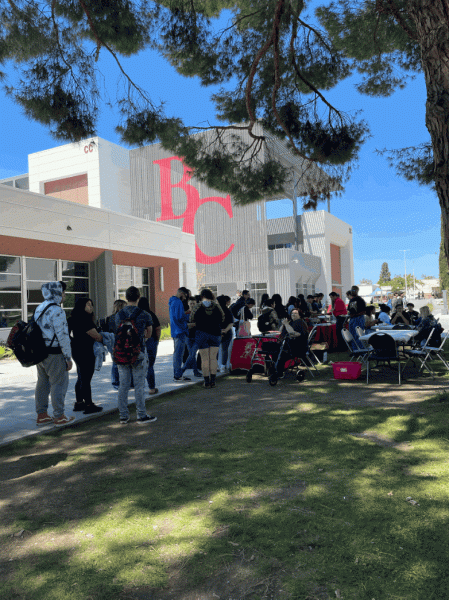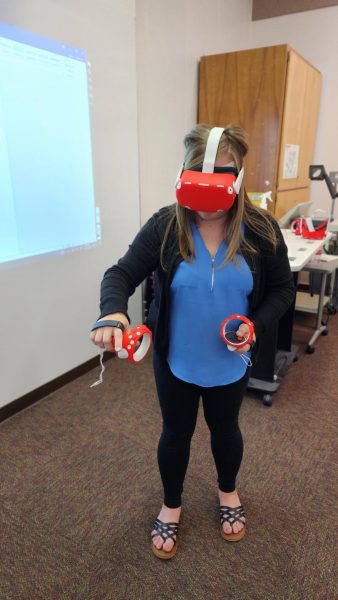“The Masks You Live In” encourages discussion about men who hide their feelings
March 11, 2018
Men do not feel authentic in their relationships. They feel like they have to hide their feelings to fit a societal model for validation and to blend in with other men, but those who do it, are living and suffering in silence, according to the documentary film, “The Masks You Live In,” by writer, director, producer Jennifer Seibel Newsom.
Both educators and students at CSUB would like to see that change, and it’s why the documentary drew attendance on Feb. 27 and created a window for that discussion to happen.
The documentary was presented by CSUB Multicultural + Gender Equity Resource Center (MAGEC) and Walter W. Stiern Library, as a part of the Walter Presents Series, in CSUBs Dezember Reading Room. It was livestreamed for those who couldn’t make the late morning showing. The film was followed up by a discussion between panelist members, which consisted of advisors, faculty members and one student. The students, and faculty in the audience explored ways in which administrators and students can work together to create an environment that deconstructs perceptions of masculinity and also show support for CSUB students who struggle with this issue.
The documentary initially aired in 2015, and was lauded by 15 Film Festival awards. The film follows boys and men as they talk about their painful and often silent transition from youth to adulthood, and the roles they must fit into in an attempt to prove their masculinity. This compulsory role that traps men is one that is just coming to light through documents like this of how men have been affected by coercive and intimidating words and experiences in the home, school, in the public setting and through media. These experiences have an often humiliating and shameful effect that distorts their self-image and reactions to the world around them, according to the documentary.
“Research shows that compared to girls, boys in the U.S. are more likely to be diagnosed with a behavior disorder, prescribed stimulant medications, fail out of school, binge drink, commit a violent crime, and/or take their own lives,” according to the documentary.
The overwhelming byproducts that are induced by the “man-up” cultural attitude is in direct correlation with the inability to express the authentic self and in turn boys and men are forced to disown or suppress their feelings and prove their manhood through actions: some actions of which have dire consequences, according to the documentary.
Caroline Heldman, a political scientist and educator in the film said that we do something called “The Great Setup.”
“We raise boys to become men whose very identity is based on rejecting the feminine and then we are surprised when they don’t see women as being fully human. So, we set them up. We set boys up who grow into men who disrespect women at the fundamental level and then we wonder why we have the culture that we have.”
Fostering a safe environment where men can strip away the barriers and allow themselves to be who they want to be and to share their feelings is a start, but doing this isn’t so easy according to CSUB’s Kristin Gibson, who served as one of the panelists, and is a sociology lecturer, and educator on gender-related coursework.
Gibson said that it’s an assumption to think that “an all-male environment is going to foster those type of feelings, that’s just not necessarily true.”
Gibson said that the men in her generation “are still hurting. They’re still trapped in the mask,” and it’s doubtful to her if they will be the ones who are able to give the boys growing up in the next generation “the tools to break outside the masculinity box.”
Gibson said that students will likely be the ones to create the kind of environment they need and the the CSUB Faculty will help facilitate that when the time comes, and she believes that they are able to provide the tools and resources that are required when it does.
Jason Watkins, Assistant Director of Programs and Services and lecturer in the psychology department also weighed in on what he felt might create a change. He believes that it begins with modeling to students it’s ok to express how they feel.
Vanessa Corona, campus advocate for domestic violence and sexual assault & education coordinator
agreed. But Corona doesn’t think there’s a fast and easy answer for eradicating the epidemic, at least not in the short term. To eradicate an entire cultural upbringing, for Corona, is impossible.
However, Gibson chimed in and gave one “concrete” way and that is to facilitate environments where boys have a chance to develop empathy. Cultural norms that develop feelings in boys and allows them the space to do that without criticism or being made fun of, is key.










